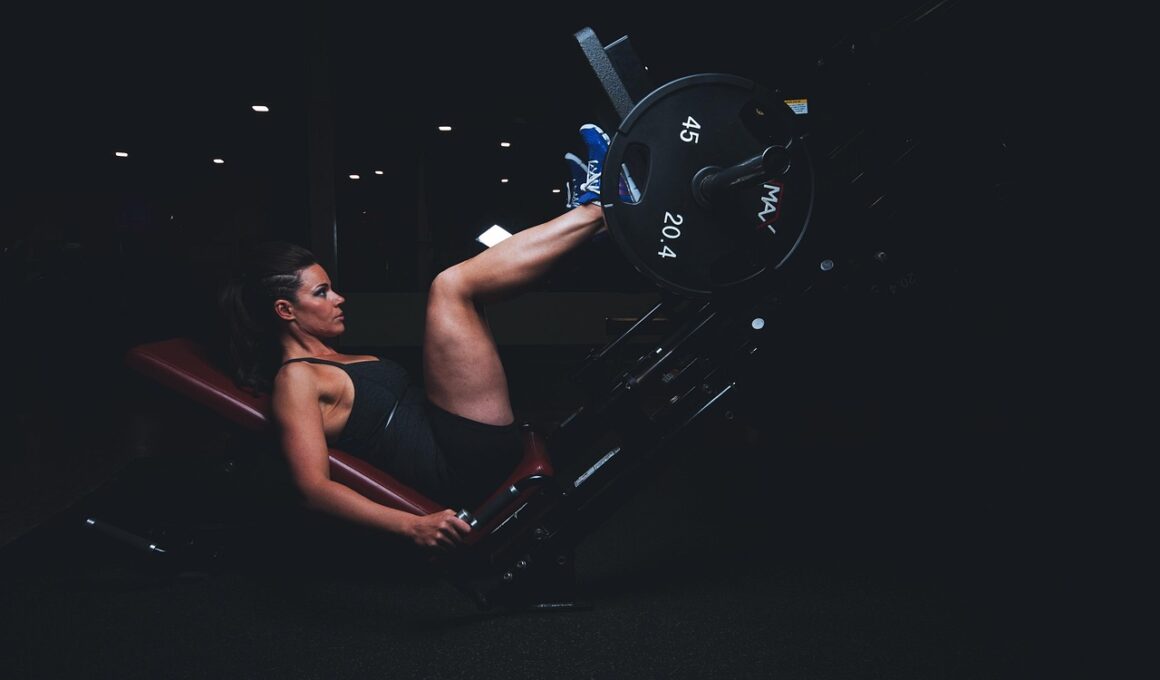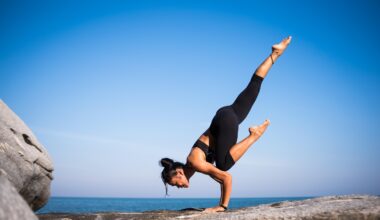Stepwise Progression of Bodyweight Exercises for Fitness Beginners
Starting your fitness journey can be daunting yet exciting, especially when you choose bodyweight exercises as your primary mode of training. Bodyweight exercises are ideal for beginners, as they require no equipment and can be performed anywhere, making them incredibly accessible. These exercises help you build essential strength, enhance flexibility, and improve your overall fitness levels. To ensure effective progression, it’s vital to incorporate a variety of fundamental movements, targeting different muscle groups. This approach helps to avoid plateaus and keeps the workout routine engaging. Beginners should focus on mastering core exercises, including squats, push-ups, and planks. Gradually increasing the intensity through variations will promote continuous improvement. For example, after mastering standard push-ups, try incline variations. Additionally, creating a weekly schedule that allows ample recovery time is crucial. Establishing a routine fosters consistency, aiding long-term results. Set realistic goals, such as accomplishing a certain number of reps or sets within a given timeframe. Remember to listen to your body and adjust the workout to suit your fitness level, gradually pushing your limits without risking injury.
Key Bodyweight Exercises for Beginners
Among the most effective bodyweight exercises, squats are foundational for developing lower body strength. They target the quadriceps, hamstrings, and glutes, promoting balance and stability. Start with basic bodyweight squats and ensure your form is correct. To perform, stand with your feet shoulder-width apart and lower your body as if sitting in a chair, keeping your chest up. Another fundamental movement is the push-up, primarily engaging the chest, shoulders, and triceps. Begin with knee push-ups for easier variations, progressing to standard push-ups as your strength increases. Planks are also crucial for core stability, testing both strength and endurance. To execute, position yourself on your forearms and toes while maintaining a straight line from head to heels. As your skills improve, progress to side planks or planks with shoulder taps to increase intensity. Lunges help improve balance and coordination, targeting the legs and glutes effectively. The bodyweight lunge can be modified into forward lunges or reverse lunges to provide variety. Incorporating these exercises will prepare your body for more advanced movements as you progress through your fitness journey.
Adopting a proper routine is crucial for effectiveness in bodyweight training. Setting a structured workout plan alleviates confusion and ensures you consistently work all muscle groups. Here’s a sample weekly plan beginners can follow. Aim for three to four workout days, alternating between full-body workouts and rest days to allow muscle recovery. On one day, focus on squats, push-ups, and planks, performing three sets of 10-15 repetitions of each exercise. The subsequent workout can emphasize lunges, mountain climbers, and glute bridges to target different areas of the body. Incorporating rest days also promotes recovery and helps prevent injury. Begin with shorter sessions of 20 to 30 minutes, progressively extending workout duration as your fitness level improves. It’s also beneficial to integrate dynamic stretching before and after workouts to enhance flexibility and reduce injury risk. Furthermore, stay hydrated, and consider a balanced diet rich in protein to fuel recovery. Consistency remains key in achieving results. Use a journal to track your progress, which can serve as motivation and provide insight into what works best for you over time.
Listening to Your Body and Avoiding Injuries
As you embark on your bodyweight workout journey, prioritizing safety and proper technique is paramount. With no equipment to support your movements, your body plays a crucial role in maintaining correct posture, joint alignment, and overall stability. Pay close attention to your body’s signals; when experiencing pain or discomfort, it’s essential to pause and re-evaluate your form or intensity. Ensure that your joints, particularly the knees and shoulders, are not overstressed during exercises. Warm-up routines and cool-down stretches can facilitate better mobility and flexibility, making your workouts more effective. Additionally, prioritize listening to your body’s need for recovery; rest is an essential component of muscular growth and injury prevention. If you feel fatigued or overwhelmed, consider adjusting your workout duration or intensity. Gradually increase the complexity of exercises as you master foundational movements, and explore modifications if needed. Remember that slow and steady progress is essential for sustainable improvement. Incorporating yoga or other mobility practices into your weekly routine may enhance your body awareness, contributing to better overall workouts.
Nutrition plays a significant role in your fitness journey, especially when engaging in bodyweight exercises as a beginner. To support your workouts and recovery, maintain a balanced diet emphasizing complex carbohydrates, lean protein, and healthy fats. Foods rich in whole grains, vegetables, fruits, and legumes provide the necessary nutrients for energy and recovery. After workouts, consuming protein-rich foods helps repair and build muscles. Hydration is equally pivotal; always keep yourself hydrated before, during, and after exercising. Consider incorporating protein smoothies or snack bars made from natural ingredients to refuel after workouts. Establishing healthy eating habits when starting on this journey will create a strong foundation for your fitness. It’s also beneficial to plan your meals and snacks for the week to avoid unhealthy choices when hunger strikes. Avoid overly restrictive diets as they can lead to burnout; instead, aim for moderation. Engage in mindful eating practices to cultivate a positive relationship with food. As your physical abilities improve through consistent training, explore nutritious recipes and meal-prepping strategies that align with your evolving lifestyle, creating healthier habits for long-term success.
Staying Motivated and Setting Goals
Achieving long-term success in bodyweight training heavily relies on maintaining motivation and setting achievable goals. Setting SMART (Specific, Measurable, Achievable, Relevant, Time-Bound) goals can help provide direction and keep you on track. For instance, instead of broadly stating you want to get fit, articulate a specific goal like performing ten consecutive push-ups within a month. As you reach these goals, celebrate small victories and recognize your accomplishments along the way. Accountability also plays a significant role in sustaining motivation. Consider joining a community or finding a workout buddy who shares similar fitness aspirations. Sharing your progress and challenges will foster both support and encouragement. Keeping a progress diary of workouts and achievements serves as a reminder of how far you’ve come, reinforcing your commitment to the journey. Explore fitness apps or online classes that can add variety to your routine. Social media platforms can also provide inspiration and connect you with others on similar journeys. Utilize podcasts or audiobooks during workouts to keep your mind engaged and entertained while exercising, transforming your bodyweight sessions into a more enjoyable experience.
In conclusion, embarking on a bodyweight exercise journey as a beginner can be incredibly rewarding. With the right approach, including consistent practice, goal-setting, and a solid understanding of proper technique, you can significantly improve your fitness levels. Gradually progressing from basic movements to more challenging variations allows for strength and skill development without overwhelming yourself. Ensure to structure your routine thoughtfully, emphasizing recovery time and listening to your body’s signals. Take into account the importance of nutrition, as fueling your body correctly supports your efforts in the gym or home workout space. Stay flexible with your fitness plans, enabling periodic adjustments and advances as you grow in skill. Staying motivated is essential, so engage with communities and celebrate your achievements, no matter how small. Remember, everyone’s fitness journey is unique; compare yourself only to where you started. As you achieve your goals, continue striving to push your limits while enjoying the process. Bodyweight exercises can empower you to lead a healthier lifestyle filled with energy and accomplishment, ultimately resulting in lifelong fitness habits that benefit your overall well-being.


